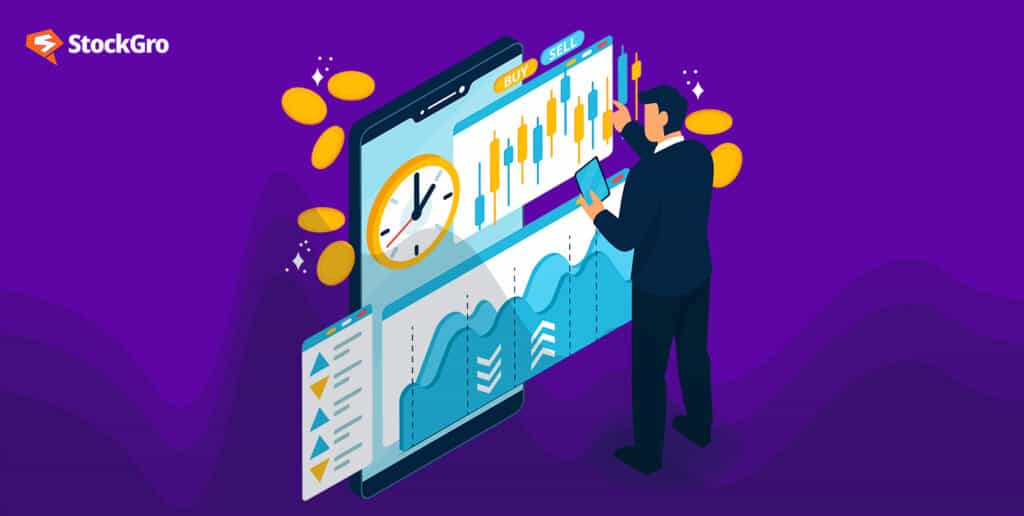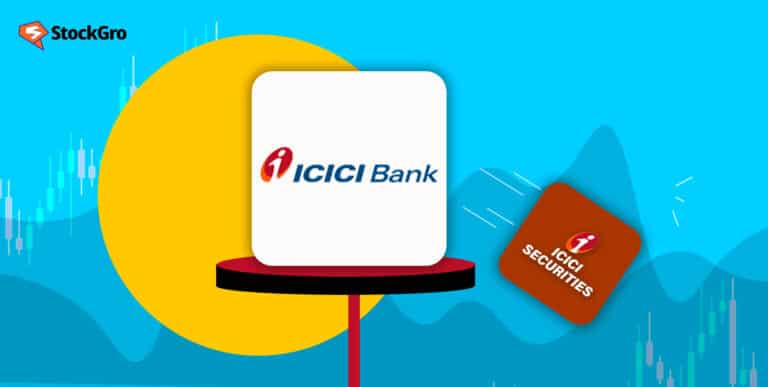
Before getting into the basics of intraday trading, it is important to understand what is intraday trading. The term intraday means “during the same day”. When a trader purchases and sells stocks listed on a stock exchange on the same trading day, it is known as intraday trading or day trading.
The primary objective behind intraday trading is to realise the profits on the same day. It also minimises trading risks as the funds are not blocked for an extended period.
In this guide, we are going to focus on how intraday trading works, its roles, and benefits.
How intraday trading works?
So, how intraday trading works? Intraday trading is done through online trading platforms that work on a real-time basis. The trader buys and sells the same number of shares of the same company within the trading hours for the day.
While using the online stock trading platform, traders must specify that the transaction is intraday. They can buy or sell stocks listed on the exchange, specifying the quantity and the price.
The position acquired by the trader (buy or sell) must be squared off at the end of the day. This means that if a trader has bought some stocks, they must be sold before trading on that stock exchange ends for the day.
A trader must also know how to sell intraday shares to make profits. If the trader has sold some stocks instead of buying it is called short-selling. In this case, the same number of shares of the same company must be bought before the trading hours end.
Here is an intraday trading example to understand how intraday trading works.
Example 1: Trader X buys 100 shares of ICICI Bank @ Rs. 930 at market opening. During the day the stock price rises to Rs. 960 and the trader squares off the position by selling 100 ICICI Bank shares @ Rs. 960. This gives him a profit of (960-930)*100= Rs. 3000 Example 2: Trader X shorts (sells) 100 shares of ICICI Bank @ Rs. 930 at market opening. During the trading hours, the stock price falls to Rs. 920. At the end of the trading day, the trader will have to square off his position by buying 100 ICICI Bank shares @ Rs. 920. This gives him a loss of (930-920)*100= Rs. 1000
Role of margins
It is essential to understand the concept of margin trading with reference to intraday trading once you know how intraday trading works. Intraday trading enables a person to trade on margins. This means that a trader with limited trading funds in his Demat account can also create open trade positions in higher trading lots by borrowing funds from his broker.
However, this leveraged trade comes with a caveat. On one side, where it can amplify the returns by allowing a trader to transact in higher amounts, it could also lead to higher losses in case the stock prices swing adversely.
You may also like: Stock Lending and Borrowing [Explained]
Intraday trading brokerage
Traders are required to pay intraday brokerage charges to their broker for executing a day trade. Intraday trading brokerage includes:
- SEBI regulatory charges
- Securities Transaction Tax
- Brokerage and GST on brokerage
- Transaction charges
- Stamp duty
Let’s understand the nuances of these charges to underand how intraday trading works better.
- SEBI regulatory charges
The Securities Exchange Board of India (SEBI) charges 0.0002% (share price * number of shares) as a fee for trading. All the stock exchanges in India charge this fee. Irrespective of whether it is an intraday transaction or delivery trading, the rate remains the same.
- Securities transaction tax (STT)
STT is charged at 0.025% of (share price *the number of shares) on the sell side of the intraday transaction.
- Transaction charges
The stock exchange on which the trade is made levies a transaction charge. These differ for the Bombay Stock Exchange (BSE) and National Stock Exchange (NSE). For BSE, it is 0.00275% per trade, while for NSE, it is 0.00325% per trade.
- Brokerage and GST on brokerage
Brokers charge an intraday brokerage fee for providing their services. These charges may differ for different brokers. Traders generally have the option of choosing from multiple brokerage plans.
- Stamp duty
Stamp duty levied on the intraday transaction varies according to the location.
Delivery Trading Vs Intraday
Delivery trading is different from intraday trading in many ways. When a stock is purchased on a delivery basis, the investor can hold on to it for as long as he wants to but with intraday trading, the position needs to be squared off on the same day.
If the trader does not square off the open position, the online platform converts it into a delivery trade at the end of the trading day and the trader then has to pay the delivery brokerage.
Also Read: How much tax do you pay on stock market gains?
Benefits of intraday trading
Intraday trading offers a sweet deal to stocks and securities traders who want to minimise their risks and maximise their profits. Here are some advantages that intraday trading has to offer:
Lower risk for traders
Since intraday trading involves buying and selling stocks on the same day, a trader can minimise the risk of substantial losses.
In the case of delivery trading, the principal amount is blocked for a considerable period. This opens up the trader to risks that come with significant price changes on the lower side in case the stock market faces a downturn.
Higher profits
Intraday trading can yield higher profits as the trader can take full advantage of the rising stock prices on a particular day by using accurate investment strategies.
For instance, higher profits can be realised easily on the same day by trading in stocks seeing a price rise due to favourable stock-related news. In case of a downside in stock prices, intraday share traders can use short selling to earn profits.
Lower commission charges
Intraday brokerage is lesser than the brokerage charged by stockbrokers for delivery trading. This is because delivery expenses of security transfer in the investor’s name are not included.
Most stockbrokers and trading houses charge an intraday brokerage fee which is one-tenth of what is generally charged in the case of standard or delivery trading.
Enhanced liquidity
Traders’ money is not blocked for a long period in this kind of trading. Since the purchase and sale of stocks happen on the same day, funds can be used for other financial requirements.
Capital gains through market fluctuations
Intraday trading gives stock traders opportunities to make profits in both bullish and bearish markets, depending upon the trading strategy used.
In a bullish market purchase and sale of stocks can yield profits, while in a bearish market trend, profits can be generated through the short-selling of stocks, which is the selling and purchase of shares.
Also Read: Risk management in stock market
How To Start Intraday Trading For Beginners
Now that you know how intraday trading works, let’s see how you can begin it.
Intraday trading can be fun, considering how one gets to buy shares and sell them on the same day. If it is your first time, however, no need to panic! Here’s a friendly guide on how to start intraday trading.
1. Understand the Basics
Understanding the basics is crucial for any beginner in intraday trading. It involves buying and selling stocks within the same day to take advantage of price fluctuations.
Knowing terms like “bull market,” “bear market,” and “liquidity” will help you navigate the market better. Additionally, grasping how intraday trading works allows you to make informed decisions about your trades, setting the foundation for your trading journey.
2. Choose a Reliable Broker
Find a broker that has a decent trading platform, low costs, and high-rated customer service. Look for users’ real-time data and several tools for trading. Besides, look for other traders’ reviews and their ratings to understand their respect among users.
Making sure your broker is trustworthy will streamline the trading process for you and allow you to concentrate on your trades.
3. Set Up a Trading Account
To set up a trading account, choose a broker and visit their website. Fill out the online application with your personal details, such as your name, address, and financial information. You may need to provide identification documents.
After submitting your application, wait for approval, which usually takes a few days, and then fund your account to start trading.
4. Develop a Trading Plan
Creating a trading plan is essential for success in intraday trading. It should include your goals, such as profit targets and loss limits, and outline your strategy for entering and exiting trades.
Define how much capital you’ll invest and the types of stocks you’ll trade. Having a clear plan helps you stay disciplined and make informed decisions under pressure.
5. Learn Technical Analysis
Technical analysis involves studying price charts and using indicators to identify patterns and trends in stock movements. This method helps traders make informed decisions about when to buy or sell.
Key tools include moving averages, RSI, and support and resistance levels. Learning to interpret these signals can improve trading accuracy and increase the chances of successful trades.
6. Manage Your Risks
Managing risks is crucial in intraday trading. Use stop-loss orders to automatically sell a stock if its price drops to a certain level, which helps limit potential losses.
Only invest money you can afford to lose, ensuring that your overall financial health remains secure. Staying disciplined and knowing when to exit a trade can protect your capital effectively.
Risk Management In Intraday Trading
In intraday trading, the goal is to capitalize on short-term price movements, but the potential for losses can be significant if proper precautions aren’t taken. Here are some essential strategies to manage risks effectively:
1. Set Stop-Loss Orders
Setting stop-loss orders is a key strategy in intraday trading that helps protect your capital. A stop-loss order automatically sells a stock when its price falls to a predetermined level.
For example, if you buy shares of a stock at ₹500 and set a stop-loss at ₹480, the stock will automatically sell if it drops to ₹480, limiting your loss to ₹20 per share. This ensures you manage risk effectively while trading.
2. Position Sizing
Position sizing involves deciding how much money to risk on each trade.
A common rule is to risk no more than 1-2% of your total capital. For example, if you have a trading account of ₹1,00,000 and choose to risk 1%, you would risk ₹1,000 on a trade.
This way, even if you face a loss, it won’t significantly impact your overall capital, allowing you to trade more confidently.
3. Diversify Your Trades
Diversification is a strategy that involves spreading your investments across different assets or trades instead of putting all your money into one.
This approach helps reduce risk because if one investment performs poorly, others may perform well and offset the loss. For instance, if you trade in stocks, commodities, and currencies, a drop in one market might not significantly impact your overall portfolio, leading to more stable returns.
4. Emotional Control
Emotional control is about staying calm and making smart decisions while trading. It means following your trading plan without letting feelings like fear or greed take over. When emotions drive choices, mistakes can happen.
Maintaining discipline helps in sticking to your strategy and managing risks effectively. Focus on the plan, keep emotions in check, and remain patient to improve overall trading performance and achieve better results.
Final word
To make profits in the stock market, traders must have a strong understanding of intraday trading and how intraday trading works. Thoroughly analyzing company charts is crucial for selecting stocks while also considering market volatility.
Unexpected market fluctuations can also lead to losses as the trader cannot hold the stocks. All intraday trader needs to do is pay close attention to intraday price movements and time the trades to make profits by using the short-term price fluctuations in the markets.

